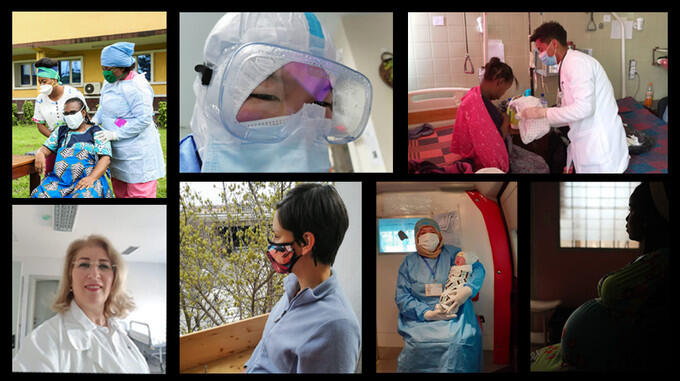Around the world, May is a time to celebrate mothers and the health workers who help them enter motherhood. Dozens of countries observe Mother’s Day in May and, on 5 May, the International Day of the Midwife honours the life-saving work of midwives everywhere.
Yet this May, as the COVID-19 pandemic sweeps through the world, these celebrations arrive on a sombre note. With health systems stretched, movement restrictions in place and concerns about disease exposure in health-care settings, mothers and midwives are risking their own health and lives to bring new life into the world.
This May, UNFPA applauds midwives and celebrates mothers, and calls for partners and governments around the world to take every possible step to ensure their safety and health.
Pregnant in a pandemic
Interviews with expectant mothers around the world show that pregnant women are living in a kind of limbo, suspended between hope and fear.
“For us pregnant women, especially for me, expecting twins, I feel scared,” said 25-year old Enxhi Merkaj in Albania. “How I am going to deliver? I am anxious.”
There is currently no evidence that pregnant women are at any more risk of infection with COVID-19 than the general population, and there is currently no evidence that the virus increases risk of miscarriage. Yet the impacts on health systems could very well imperil women.
The pandemic is limiting sexual and reproductive health services around the world. In many places, health resources are being diverted to pandemic response. In addition, women report being reluctant to seek care from health facilities for fear of exposure to the virus, or they face barriers to health care due to lockdown-related restrictions.
Midwives on the front lines
Enxhi was attending a consultation with Arjana Pojani, the hospital’s chief nurse-midwife, who reassured her that every measure was being taken to preserve the health of her pregnancy. Even so, Arjana has her own concerns. “What is happening all over the world kind of puts us at risk, too,” she said. “But our priority is pregnant women.”
Midwives around the world express their commitment, but also their concern whether they will have enough personal protective equipment (PPE) to keep the pandemic at bay and whether long-term supplies will be availble. And concerns are greater still in health systems already under strain from humanitarian crises.
In South Sudan, midwife Justine Mangwi compares the pandemic to his country’s war for independence: “Now, it is the turn of health workers to fight the coronavirus war for our country.”
Investments needed
Yet despite the extraordinary stress and uncertainty, midwives continue to provide an invaluable service to their communities.
They offer not only antenatal and safe delivery care, but also a full range of sexual and reproductive health services – from family planning counselling and STI screening to post-natal care. They also provide care to survivors of gender-based violence. All of these services could be curtailed if health systems are overstressed by the pandemic.
UNFPA is calling for policymakers, leaders, partners and advocates to protect the maternal health workforce – and, by extension, mothers as well – with the resources, support and supplies needed to ensure quality care remains available.
Investments in midwifery are also needed to expand access to care. Quality midwifery care could avert more than 80 per cent of all maternal deaths, stillbirths and neonatal deaths. With partners including health ministries and private sector actors, UNFPA is scaling up midwifery resources around the world.
As part of its pandemic response, UNFPA is also working to secure the PPE, sanitizing supplies, and the sexual and reproductive health commodities needed for midwives and other health workers to provide consistent quality care to all women and girls. A global campaign is currently raising funds to help these efforts.
As for mothers and midwives, those interviewed say that, even with the challenges they face, they are optimistic for the future.
“I am hopeful and feel courage,” said Enxhi Merkaj in Albania. “I hope everything will be alright.”


